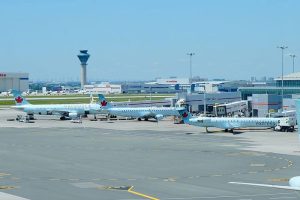UPDATE: Unsurprinsingly, a deal has been reached and the strike has been averted!
If you are planning to travel soon, you should be aware that over 9,000 employees of the Canada Border Services Agency (CBSA) are considering a nationwide strike. Their actions could start as early as Friday, June 14th, potentially causing massive delays for travelers.
Here are the details of the CBSA’s strike mandate and how this could impact your travel plans.
Overview of the potential CBSA strike
This strike is a very real possibility, just in time for the busy summer travel season.
Here are the essentials:
- Over 9,000 employees of the CBSA have secured a strike mandate
- 96% voted in favor of the strike
- Includes agents at the land borders and airport customs
- 90% are designated as essential workers
- So they can’t fully stop working
- But they can purposely slow down a whole lot
- The CBSA and the Treasury Board are currently negotiating
- If an agreement is not reached, the union promises to strike
- They have set a deadline of Friday, June 14th
- The employees are asking for several changes
- Better salaries
- More permanent employment
- Pension benefits
- Remote work
The union is very proud to state that a similar strike they did 3 years ago “nearly brought commercial cross-border traffic to a standstill, causing major delays at airports and borders across the country.”
It’s definitely not a sure thing, as agreements are often concluded at the very last minute. But if you absolutely must be somewhere on time, take this strike possibility into account and plan accordingly, whether you are entering Canada at a land border or in an airport.
How the potential CBSA strike would impact your travel
As mentioned, 90% of border guards working for the CBSA are considered “essential workers” so they are not allowed to stop working during a strike.
However, they can instead use the work-to-rule strategy to obtain what they want. This would mean longer lines and more time for border crossings into Canada and international arrivals in Canadian airports.
Work-to-rule is a different way of protesting when employees follow exactly what is required by their contract of employment. All duties not specified in the contract are ignored.
Employees start doing the bare minimum and focus on time-consuming rules that are usually not enforced.
They can also purposely slow down their work by taking a lot more time to process every traveler, as that is up to their discretion.
Each traveler could be asked more questions than usual, causing each passage to take an extra 5 to 10 minutes, maybe more.
Not only is this annoying on an individual level, but it also hurts the Canadian economy as fewer goods and travelers would cross the border every day.
As a result of work-to-rule, the workers are still working but are less productive, if not completely inefficient. So while it’s not a complete strike, it can slow things down just as much.
So if this happens, you should plan more time to go through customs.
Learning how to travel for less
Join over 100,000 savvy Canadian travelers who already receive Flytrippers’ free newsletter so we can help you travel for less (and keep you updated on all things travel)!
Summary
The union representing Canadian Border Services Agency employees is threatening to strike as early as Friday, June 14th if no agreement is reached. This could mean long delays for travelers at the land borders and at airport customs.
What would you like to know about the border strike in Canada? Tell us in the comments below.
See the flight deals we spot: Cheap flights
Discover free travel with rewards: Travel rewards
Explore awesome destinations: Travel inspiration
Learn pro tricks: Travel tips
Featured image: Canadian border (photo credit: Hermes Rivera)




